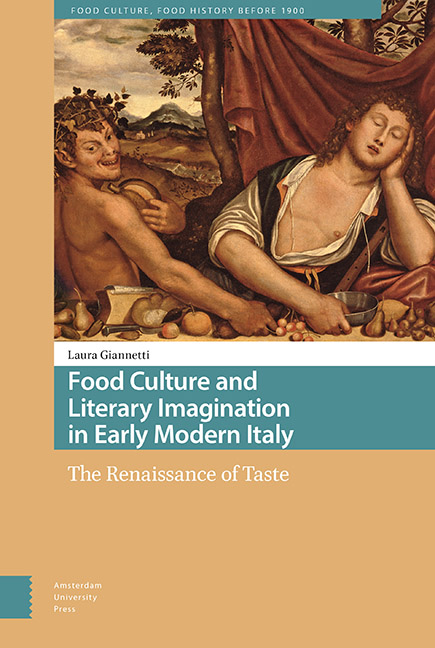1 - Italian Renaissance Food-Fashioning
Published online by Cambridge University Press: 13 May 2022
Summary
Abstract
Prescriptive discourses regarding food and the traditional social classification of food itself were picked up by the literary imaginary in Renaissance Italy, often reversing them to create new and provocative ideals about the proper diet for different classes. Two traditional luxury foods – fruit and roasted fowl – thus descended from their original Parnassian culinary heights to command a place at both the metaphorical and real table for a much wider social spectrum, including especially the up-and-coming. The reverse was also true, in a way, as a growing appreciation of raw vegetables led to a change in their status from lowly food to aristocratic delicacy – a shift that became a distinctive trait of Italian cuisine and culture from the sixteenth century on.
Keywords: prescriptive discourse, diet, class, luxury foods, lowly foods, delicacy
Introduction
In a highly literary letter penned by Pietro Aretino (1492-1556) in 1537 and usually known as Il sogno del Parnaso, the poet recounts one of his dreams to a Venetian friend, Gianiacopo Leonardi. The central part of the dream takes place in a large kitchen where Aretino finds himself watching a cook tend a phoenix roasting on a spit, its rich smell permeating the room. Nearby, a group of very thin and hungry men are watching him, eyeing with envy the contented fatness of his body. Aretino, notorious gourmet ante litteram, interrupts the cook – who happens to be singing a poem by Francesco Berni (1497-1536) or Giovanni Mauro D’Arcano (1496-1536) to the beat of the turning spit – to taste a bite of the succulent meat. At this precise moment, the god Apollo makes an appearance and incites Aretino to eat. Recalling the punishment of ever-hungry Tantalus, which was quite often depicted in early modern visual representations of a glutton's Hell, the god encourages Aretino to satiate himself with no reserve on the roasting meat, right in front of the group of hungry onlookers, in order to maximize their suffering. Why should these men suffer in this infernal kitchen with its delicious smells, and who are they? They are a group of famous contemporary poets, the Vignaiuoli, at fault (according to Aretino) for having fed the Muses of Poetry with ‘cabbage, herbs, and salads’.
- Type
- Chapter
- Information
- Food Culture and Literary Imagination in Early Modern ItalyThe Renaissance of Taste, pp. 29 - 86Publisher: Amsterdam University PressPrint publication year: 2022



